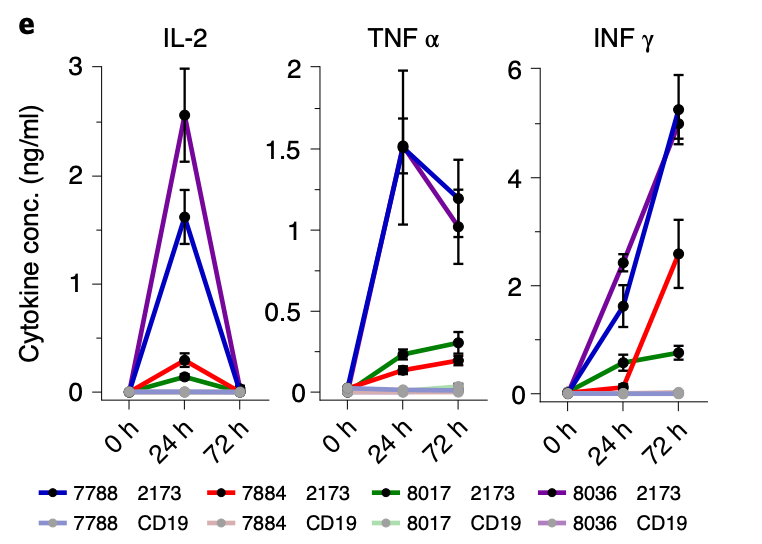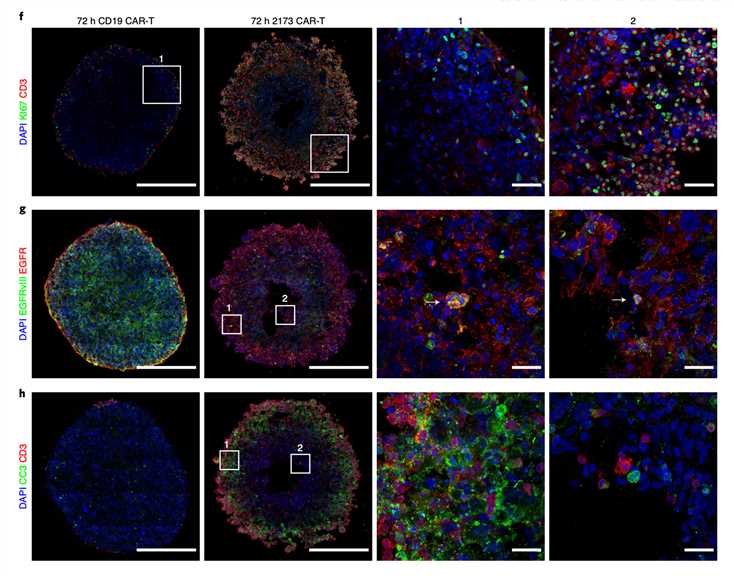All products and services are For Research Use Only and CANNOT be used in the treatment or diagnosis of disease.
 Fig.1 Immunofluorescence image of brain organoids.
Fig.1 Immunofluorescence image of brain organoids.
(Nowogrodzki, 2018)
3D in vitro organoid models have become the most popular tool in brain and related disease research. Glioblastoma is the most reported brain cancer with a poor prognosis and survival rate. Organoids recapitulate the genotype and phenotype of primary tumors of cancer and may be a suitable model to imitate the inter- and intra-tumoral heterogeneity in vivo.
With extensive experience in stem cell research, Creative Biolabs is competent in tissue processing, stem cell culture, and differentiation. We offer a brain cancer organoid platform for investigating CAR-T response in patients by applying powerful immunohistology, fluorescence microscopy, and advanced image capture and analysis techniques.
 Fig.2 Establish brain cancer organoids from PSC using Nucleofection. (Ogawa, et al., 2018)
Fig.2 Establish brain cancer organoids from PSC using Nucleofection. (Ogawa, et al., 2018)

The histological and genomic characteristics of the established organoids and the initial tumors are measured, using various advanced tumor profiling technologies.
01Establishing organoids with stable efficiency, routinely 2-4 weeks.
02CAR-T efficacy test is completed in one week.
03Organoids allow genome edition using transposon, CRISPR-Cas9, and lentivirus.
04The success rate for GBOs ranges from 75% to 95%.
Creative Biolabs provides a full range of key products associated with CAR-T cell development. The list presents brain cancer-related antigen proteins and related products and can be applied to in vitro and in vivo validation assays.
| Target antigen | Target description | CAR-T cell |
| GD2 | GD2, also called ganglioside G2 or GRD2, is over-expressed on neuroectoderm-initiated tumor cells. | Anti-GD2 CAR-T |
| VEGFR2 | VEGFR2 is one of the receptors of vascular endothelial growth factor (VEGF), and the interaction of the two proteins mediates endothelial growth and movement. | Anti-VEGFR2 CAR-T |
| EGFRvIII | EGFRvIII is a variant of EGFR (Epidermal growth factor receptor) with the deletion of six exons in the EGFR gene and is of high expression in glioblastoma. | Anti-EGFRvIII CAR-T |
| Establishing A Living Biobank of Patient-derived Glioblastoma Organoids and Its Use for CAR-T Efficacy Tests |
Highlights:
|
 Fig.3 Increased cytokines (IL-2, TNF-α, and IFN-γ) production after co-culture of EGFRvIII+ organoids with targeted CAR-T cells. (Jacob, et al., 2020) |
 Fig.4 Combined immunohistochemical staining and confocal image to analyze CAR-T cell proliferation, tumor organoids apoptosis and antigen loss after incubation with specific CAR-T. (Jacob, et al., 2020) |
Creative Biolabs offers advanced organoid technologies and high-quality cancer organoids for cancer biology discovery. The organoid model system is also a functional platform for drug efficacy tests. If you are interested in our services, please contact us for a quote.
References
For any technical issues or product/service related questions, please leave your information below. Our team will contact you soon.
 NEWSLETTER
NEWSLETTER
The latest newsletter to introduce the latest breaking information, our site updates, field and other scientific news, important events, and insights from industry leaders
LEARN MORE NEWSLETTER NEW SOLUTION
NEW SOLUTION
CellRapeutics™ In Vivo Cell Engineering: One-stop in vivo T/B/NK cell and macrophage engineering services covering vectors construction to function verification.
LEARN MORE SOLUTION NOVEL TECHNOLOGY
NOVEL TECHNOLOGY
Silence™ CAR-T Cell: A novel platform to enhance CAR-T cell immunotherapy by combining RNAi technology to suppress genes that may impede CAR functionality.
LEARN MORE NOVEL TECHNOLOGY NEW SOLUTION
NEW SOLUTION
Canine CAR-T Therapy Development: From early target discovery, CAR design and construction, cell culture, and transfection, to in vitro and in vivo function validation.
LEARN MORE SOLUTION